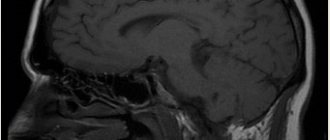Depression during different periods of pregnancy
The psychological state of the expectant mother changes for various reasons.
Not only the successful bearing of a child, but also the course of childbirth and the postpartum period depends on her well-being. The problem can arise both in the first trimester and closer to the resolution of the condition. Depressive disorders in pregnant women (prenatal) occur in 10-25% of cases. The number of cases increases in later stages (33-37%).
Negative symptoms often have varying intensity throughout the entire gestation period. However, objective research is insufficient to identify clear criteria for distinction.
Early dates
After discovering an “interesting situation,” the girl will have to adapt to the changed living conditions. Not every person easily accepts the news of possible motherhood, which is accompanied by heavy psycho-emotional stress. The situation worsens significantly with the development of early toxicosis (not in everyone).
The circumstances that arise are not always planned, so a violation of the usual routine causes internal discomfort and panic. Questions are raised about the future, work/study, the financial side of the issue, interpersonal and family relationships. Affective disorders (mood pathologies) can be a reaction to social and psychophysical changes.
Late dates
Normal intrauterine development of the fetus is carried out thanks to many neurohumoral processes occurring in the woman’s body. This complex mechanism is controlled largely by hormones, which also influence other systems.
In the second half of pregnancy, the girl’s appearance changes, and her general health may deteriorate. The likelihood of psycho-emotional disorders increases with the development of gestosis or other complications. In severe cases, patients are hospitalized for observation until delivery.
Before and after childbirth
Depressive symptoms may intensify or appear for the first time immediately before the birth of a child with a further transition into the postpartum period. The process of bringing a baby into the world can hardly be called easy. The experience is a strong stress factor not only for the body, but also for the human psyche.
Not everyone can immediately adapt to the role of a mother after this, especially in the absence of adequate help from loved ones. Pounding worries, the need to be at the baby’s bedside around the clock, responsibility for a new life - only aggravate the situation. There is a danger to the life of mother and child.
Causes
Pregnancy in rare cases can be a provocateur of mental disorders or aggravate pre-existing diseases. In the development of the disorder, the complex of unfavorable factors affecting a person (biochemical, social, psychological) is important, among which the following are most often identified:
- genetic disorders and hereditary predisposition;
- previous interrupted or lost pregnancies, including abortions and miscarriages;
- neuroendocrine changes in the body;
- marital conflicts;
- primary dysmenorrhea – pre-existing menstrual irregularities;
- adolescence;
- loneliness;
- fears of new experiences;
- criticism from loved ones or others
- social disadvantage;
- psychotraumatic experiences, including distant ones (childhood, stress during puberty);
- concomitant somatic diseases, especially severe or incurable;
- disability;
- low marital satisfaction;
- difficult working conditions or impending unemployment;
- exposure to pharmaceutical drugs that the pregnant woman took without knowing about her situation;
- history of drug or alcohol abuse;
- social pressure on a girl “in position”, concern with stereotypes;
- severe pregnancy, threat of miscarriage, severe toxicosis/gestosis;
- unfavorable microclimate in the family or work team.
Stressful events usually precede or precipitate symptoms of a depressive episode, but not necessarily. Symptoms may occur for no apparent reason. At high risk are girls who initially had a predisposition to the development of psychoneurological problems (premorbid personality traits).
Pregnancy and COVID-19: what is known from research results
Last February, when reports of COVID-19 began to emerge in the United States, Yalda Afshar was three months pregnant. Afshar is an obstetrician and gynecologist who works with high-risk pregnant patients at the University of California. So she knew that respiratory viruses were especially dangerous for pregnant women.
There was very little data on the effects of SARS-CoV-2, and with the number of infections rapidly increasing, Afshar felt as if she was groping in the dark - both as she counseled patients and as she dealt with her own fears about the virus and the possibility of passing it on to her child. and family members. But her position also brought her closer to the women she treated. “I felt a solidarity that I had never felt before. It gave me the strength to work harder and try to find answers faster,” she says.
Afshar and colleagues across the country created one of the first databases in the United States to track the conditions of women who were diagnosed with coronavirus during pregnancy. During 2021, more than a dozen similar projects were launched.
More than a year into the pandemic, research from teams around the world shows that pregnant women with COVID-19 have a higher risk of hospitalization and severe illness than non-pregnant women of the same age.
The good news is that babies don't get sick often and almost never get severely ill from COVID-19. Results from analyzes of placenta, umbilical cord and blood samples from mothers and infants indicate that the virus is rarely transmitted from mother to fetus. However, preliminary evidence suggests that infection with the virus can damage the placenta and possibly harm the baby.
Many questions still remain unanswered. Researchers want to know how common COVID-19 infection is among pregnant women overall, since most of the findings involve women admitted to hospital for various reasons throughout pregnancy. They are also examining whether women are more vulnerable to contracting the virus or to the effects of COVID-19 at any particular stage in pregnancy or after giving birth.
In particular, there is still a lack of data on the safety of vaccination. Following regulatory guidelines, none of the major vaccine makers included pregnant women in their early studies. Now, however, such a group is planned in some ongoing and upcoming studies. As health systems around the world began vaccination campaigns, regulators began offering conflicting or unclear advice on whether pregnant women should be vaccinated.
In January, the World Health Organization (WHO) recommended that mRNA vaccines (made by Moderna and Pfizer/BioNTech) be administered only to high-risk pregnant women, such as those working with COVID-19 patients or those with chronic illnesses, and only after consulting a doctor . It was later added to clarify that there are no known specific risks associated with the use of these vaccines during pregnancy. A WHO spokesperson told Nature that due to a lack of data, the organization "cannot make a general recommendation on vaccination for pregnant women."
Most doctors contacted by Nature say they would recommend pregnant women get vaccinated after consulting with their doctor. “Given what we know about the increased risk of hospitalization, mortality and preterm birth, in my opinion the answer is obvious,” says Christina Adams Waldorf, an obstetrician-gynecologist and researcher at the University of Washington in Seattle.
Risks during the prenatal period
It is not surprising that respiratory viruses are dangerous for pregnant women, since their lungs are already working harder than usual. As the uterus grows, it puts pressure on the diaphragm, reducing lung capacity and reducing the oxygen supply to the mother and fetus. Moreover, during pregnancy the immune system is suppressed so as not to harm the fetus. This makes women more susceptible to complications from infection. For example, pregnant women who contract influenza have a higher risk of hospitalization than non-pregnant women. Pregnant women who contracted H1N1 influenza during the 2009–2010 pandemic had a higher risk of preterm birth and stillbirth.
That's why obstetricians and gynecologists around the world watched the spread of SARS-CoV-2 with concern early last year, wondering how the infection would affect their patients: mothers and children.
Initial data from China indicated that pregnant women did not fare much worse than non-pregnant women of the same age. But doctors treated these data with skepticism. "It didn't resonate very well with a lot of OB-GYNs," says Andrea Edlow, an OB-GYN at the Vincent Center for Reproductive Biology at Massachusetts General Hospital in Boston. She adds that many doctors have seen this with their patients: “Pregnant women were more seriously ill than other women.”
The picture began to be completed thanks to reports coming from different countries. An analysis of 77 cohort studies published last September clearly showed that pregnant women are at increased risk. The review included data from an analysis of more than 11,400 women with confirmed or suspected COVID-19 who were hospitalized for any reason during pregnancy.
Pregnant women diagnosed with COVID-19 were 62% more likely to require transfer to an intensive care unit compared with non-pregnant women of reproductive age; Pregnant women were 88% more likely to require ventilation. A study conducted by the US Centers for Disease Control and Prevention (CDC) showed similar results. This study included more than 400,000 women who tested positive and had symptoms of COVID-19, 24,434 of whom were pregnant. The results showed similar values for the increased risk of ICU transfer and ventilation in pregnant women.
Health care workers should be aware that pregnant women are less likely than non-pregnant women to show symptoms of COVID-19, says Shakila Thangaratinam, a maternal and perinatal health researcher at the University of Birmingham, UK, who led the analysis of 77 data from the studies. But she acknowledges that the sample was limited to women hospitalized for any reason, which may have masked the true scale of the problem. “I think we need to start systematically collecting information about what is happening in the population,” she says.
Pregnant women with COVID-19 were more likely to have preterm births than pregnant women without the disease, according to two registries looking at more than 4,000 women with confirmed or suspected COVID-19 in the US and UK. 12% of UK registry participants gave birth before 37 weeks (the rate in England and Wales was 7.5% in 2020). In the United States, 15.7% of women with COVID-19 experienced preterm birth (the national rate is typically 10%). According to an analysis by a team of scientists from the University of Birmingham led by Shakila Thangaratinam, pregnant women with COVID-19 are three times more likely to have a preterm birth than pregnant women without the disease.
Many studies agree on other risk factors that may worsen COVID-19 in pregnancy. These factors include obesity, high blood pressure and gestational diabetes. However, more data is needed to quantify the impact of each factor, Thangaratinam says.
From mother to child
If a mother has COVID-19, will her baby be affected? Premature birth can cause health problems for the baby in the future. But most preterm births in women with COVID-19 occur in the last trimester of pregnancy, when the fetus has the best chance of developing healthily.
It is encouraging that COVID-19 is not currently associated with an increased incidence of stillbirth or fetal growth restriction. “We can be relatively calm because the likelihood of stillbirth and fetal growth restriction is not increased,” says Christophe Lies, a gynecologist at Imperial College London who was involved in a comparative analysis of 4,000 women in the US and UK.
One of the questions early in the pandemic was whether SARS-CoV-2 could be transmitted from mother to child. Edlow, who became interested in him, changed the focus of her team from studying obesity in pregnant mice to compiling a registry of data from pregnant patients and a repository of biological samples. As other laboratories working on less essential areas closed, their staff donated their equipment and reagents, and Edlow's team began collecting and studying samples of maternal and umbilical cord plasma, as well as placenta.
Research results published by her team in December confirmed existing evidence that such “vertical transmission” of infection was rare. In 62 pregnant women who tested positive for SARS-CoV-2 through a nasal or throat swab, Edlow's team found no traces of the virus in their blood or cord blood. Also, none of the 48 babies from whom swabs were taken were found to have coronavirus. “It is fortunate that SARS-CoV-2 does not cause serious illness or death in infants,” Edlow says.
Afshar's team also showed that children born to mothers infected with coronavirus were usually healthy. In a study evaluating 179 infants born to SARS-CoV-2-positive women compared with 84 infants whose mothers tested negative, most infants were healthy at birth and for 6 to 8 weeks after birth.
The question of whether mother's immunity is passed on to her child is more complex. Edlow's team and other researchers have found antibodies to SARS-CoV-2 in the umbilical cord blood of infected women, but Edlow said it's still not entirely clear how much protection this amount of antibody might provide to the fetus.
A correlation has been found between severe viral infections in mothers and an increased likelihood of depression and autism spectrum disorder in their children, and researchers want to understand whether SARS-CoV-2 may have this effect, too. There is currently no evidence that SARS-CoV-2 infection in mothers can affect children in the same way. It may take years to discover such a relationship, but some scientists are tracking any neurodevelopmental delays in children in study cohorts. Thus, Afshar’s team will monitor children for a year after birth.
In rare cases, the placenta may play a key role in the development of the disease, says David Baude, an obstetrician-gynecologist at the University of Lausanne in Switzerland, who is studying 1,700 pregnant women around the world using a registry architecture his team developed to study the Zika virus in 2009.
Bod's unpublished data suggests that in some cases of COVID-19, pregnant women develop an inflammatory response (the body's defense against the virus) that can damage placental tissue, similar to how lung tissue is damaged. In three cases observed by the researcher, women with similar abnormalities in the placenta gave birth to children with brain damage.
Lack of vaccine data
All this convinces many doctors that pregnant women should be among the first to receive the COVID-19 vaccine. But because pregnant women were not included in early vaccine trials, the question of their safety for this group remains unanswered. “I think it was a huge mistake not to include them in research, because now almost every patient is forced to be a laboratory mouse,” says Adams Waldorf.
Regulators have chosen different strategies, forcing many pregnant women to make their own decisions about vaccination. Both the CDC and the UK's Joint Committee on Vaccination and Immunization recommend that pregnant women at increased risk of illness from COVID-19 (that is, those who have chronic health conditions or work with infected people) consult with their doctor about getting vaccinated.
The Swiss government initially did not include pregnant women in the priority group for vaccination, citing a lack of data. Bode disagrees with the decision, arguing that the risk associated with the disease is much higher and the biology of the mRNA vaccines does not pose a particular threat. “It is very, very unlikely that the vaccine will cause any health problems for the pregnant patient or the fetus.” The Swiss Federal Office of Health is now offering vaccinations to pregnant women with certain chronic diseases.
In the US, both the Food and Drug Administration (FDA) and the CDC monitor the effects of vaccinations on pregnant women. A team from the University of Washington initiated a survey for women who are pregnant, breastfeeding or planning to become pregnant and have received the vaccine. By the end of January, 12,000 responses had been collected. US presidential health adviser Anthony Fauci said in February that 20,000 women had received the Pfizer/BioNTech or Moderna vaccines and regulators had found “nothing suspicious.” And nearly a year after it began Phase I trials studying its COVID-19 vaccines in humans, Pfizer has begun a trial in pregnant women.
Researchers and advocacy organizations want to use the example of COVID-19 to change the standards of future clinical trials to include pregnant women from the start. Leaders of the Eunice Kennedy Shriver National Institute of Child Health and Human Development in Bethesda, Maryland, said in February that "pregnant and breastfeeding women should not be protected from participating in research; they should be protected while participating in it."
It was the concern that this group of patients would be forgotten that motivated Afshar to begin her research. “In many studies, pregnant women are overlooked. But if we don’t do the research to find the answers, no one will do it for us.”
Symptoms
Anxiety of varying severity occurs in almost 40% of women during normal pregnancy. In addition, we must not forget about the possible sharpening of individual character traits. Only a doctor can identify signs of an emerging disorder in a timely manner, which is why it is so important to regularly appear for examinations with your obstetrician-gynecologist, honestly reporting even minor (at first glance) experiences.
For formal diagnosis, the disease criteria specified in ICD-10 (International Classification of Diseases) are used. Possible violations are indicated by the appearance of the following symptoms:
- anxiety regarding the course of pregnancy, one’s own life;
- expressed fear of complicated childbirth, loss of a child;
- thoughts about one's own death;
- apathy;
- severe irritability;
- appetite ranges from acute hunger to complete absence and aversion to food;
- a woman stops enjoying activities that previously brought her joy;
- persistently increased fatigue not related to physical condition;
- mood is depressed most of the time, which does not depend on others or personal circumstances;
- emotional alienation from a partner, indifference to the growing fetus;
- suicidal behavior;
- obsessive ideas of harming the child;
- sleep problems;
- staying in solitude - a person does not want to see even the closest people;
- low self-esteem;
- obsessive feelings of guilt, shame, worthlessness.
Characters have emotional “outbursts” like a sharp jump in mood, but a temporary improvement in condition does not indicate the absence of a disorder. The pregnant woman delves into endless worries about the fate of the child and changes in her own life. Some patients, on the contrary, go into “denial”, reacting negatively to the development of the fetus.
Somatic symptoms of depression are difficult to distinguish from possible toxicosis, gestosis, or exacerbation of chronic pathology. Patients often lack criticism of their condition. People around you begin to notice changes in behavior, personality, and mood.
Scandal for your health!
Don't hold back or hide your emotions. There is absolutely no benefit from this - neither to you nor to your loved ones.
Firstly, it is harmful to health: people who experience everything within themselves are prone to hypertension and other cardiovascular diseases. Secondly, constantly holding back irritation can lead to the fact that at one point it breaks out with even greater force. Thirdly, you can hide the cause of resentment or anger, but not the condition itself. And it’s unlikely that it will be easier for those around you if, saying that everything is fine, you sit all evening with a gloomy look in front of the TV or stand by the window, wiping your tears. Of course, breaking dishes and screaming is not the only way to return emotions to normal. Everyone knows their own, “bloodless” methods. Women in such a situation, as a rule, want to speak out - after all, they are more emotional than men. So talking to a friend can change the situation for the better. Walking around the city helps some, while others escape anger and stress by hand washing (preferably large items).
If you are one of those who, in order to relax, definitely need to “say everything that’s boiling over”, then consider a few points. First, don't let your emotions control your actions. Remember the wise saying “The morning is wiser than the evening”; now it is very useful. And if, in the heat of a scandal, you have a desire to immediately pack your things and go to your mother, or get a divorce, or quit your job - postpone this decision until the next morning, or even better, the next day.
Second, make sure that your loved ones do not suffer too much from your mood swings, attacks of resentment, or even aggression. Of course, you have every right to all this, especially now, but what should they do? They cannot understand the full range of your experiences, no matter how hard they try. Maybe it would be better if you explained that your condition is not always controllable and asked them to be patient?
Third, you should not feel guilty about this. Irritability, anxiety, and anger do not mean that you are a bad wife and mother. This is a completely normal reaction to a change in situation. A little time will pass and everything will fall into place.
Fourth, remember that we can still do a lot to become more balanced and calm. Moreover, it is often enough to use the simplest relaxation methods and “remake” your day a little.
Why is depression dangerous in pregnant women?
Anxiety and depressive disorders can occur in mild forms with unexpressed symptoms. However, there is a possibility of developing the following consequences:
- Miscarriage.
- Insomnia.
- Increased risk of bleeding, hypertension, maternal mortality.
- Fetal growth retardation, rapid heartbeat, risk of mental (rarely somatic) diseases in the newborn.
- Severe gestosis, the appearance of preeclampsia.
- Suicidal thoughts and behavior.
- Premature delivery, the need to resort to caesarean section.
- Introducing the expectant mother to cigarettes, alcohol, and drugs.
- Low adherence to obstetric and gynecological supervision, late seeking help.
- Insufficient baby weight at birth, subsequent problems with appetite.
- Self-harm, attempts to independently terminate pregnancy and even get rid of the fetus.
Clinical studies have established a connection between prenatal depression and the appearance of psychoneurological diseases in children in the future, for example, ADHD (attention deficit hyperactivity disorder). Depression can threaten the lives of mother and baby. However, in most cases, babies develop absolutely normally.









